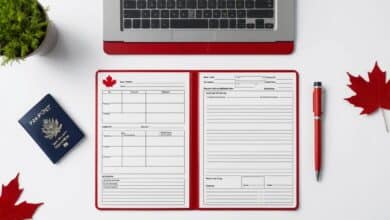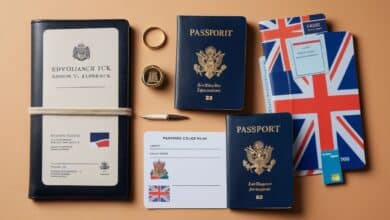Step-by-Step Guide to Marriage Visas & Sponsorship in Montreal
Canada’s immigration system places strong emphasis on keeping families together.
Over 100,000 individuals gain permanent residency annually through family sponsorship programs, with spousal sponsorship applications making up 80% of these cases. For couples in Montreal, this process combines federal guidelines with Quebec’s unique requirements.
Sponsoring a spouse partner involves careful planning. Applicants must meet financial obligations, provide extensive documentation, and follow provincial rules specific to Quebec. These extra steps ensure compliance with both national and regional policies.
This guide simplifies the journey for sponsors who are Canadian citizens or permanent residents. It breaks down critical stages like eligibility checks, paperwork preparation, and processing timelines. Understanding these phases helps avoid errors that could delay reunification.
Quebec’s additional forms and extended sponsorship undertakings often surprise applicants. By addressing these details early, couples can streamline their path to approval. Whether applying for a common-law partner or conjugal relationship, clear instructions make the process manageable.
Introduction to Marriage Visas & Visa Sponsorship in Montreal
Sponsorship programs serve as vital bridges for couples separated by international borders. Through spousal sponsorship, Canadian citizens and permanent residents can help partners obtain residency while contributing to national family reunification goals. This family class pathway operates under strict guidelines to protect all parties involved.
Three relationship categories qualify for this program: legally wedded partners, spouse common-law partners cohabiting for at least one year, and conjugal partners facing exceptional barriers. Applications undergo dual reviews – verifying both the sponsor’s capability to support their partner and the applicant’s eligibility for Canadian residency. Most cases conclude within 12 months when documentation meets requirements.
Choosing between inland and outland applications significantly impacts processing options. Inland applicants often qualify for work permits during processing, while outland cases may proceed faster through visa offices abroad. Quebec’s regional requirements add extra verification steps but follow the same national principles of fairness and inclusivity.
Canada’s progressive policies welcome diverse unions, including same-sex partnerships. This approach ensures equal access to reunification opportunities while maintaining rigorous standards to prevent abuse of the system.
Overview of Canadian Immigration and Family Sponsorship
Immigration, Refugees and Citizenship Canada (IRCC) manages all sponsorship applications nationwide. This federal agency sets strict guidelines to balance family reunification goals with financial accountability. Every year, thousands of families reunite through programs prioritizing both emotional bonds and economic stability.
The system focuses on two key objectives. First, it grants permanent residence to eligible relatives. Second, sponsors must legally promise to cover essential living costs for up to three years. These requirements protect sponsored individuals from needing public assistance.
Canadian citizens and permanent residents can sponsor spouses, common-law partners, or dependent children. This family class accounts for nearly 30% of annual immigration targets. Sponsors prove financial stability through income documents, tax records, and employment verification.
Applications undergo multiple checks. Medical exams ensure public health safety. Security screenings confirm no criminal history exists. Quebec adds provincial reviews through MIFI, extending processing times but maintaining national standards.
Temporary resident visas let families stay together during processing. While not a guaranteed path to PR status, they offer flexibility for couples awaiting final decisions. Proper documentation remains critical at every stage.
Understanding Eligibility Requirements for Sponsors in Montreal
Navigating sponsorship rules requires precise understanding of who can initiate the process. Quebec’s system adds layers to federal standards, demanding thorough preparation from applicants.
Sponsor Eligibility Criteria
To qualify as an eligible sponsor, individuals must satisfy three non-negotiable conditions:
- Be 18+ years old with confirmed status as a Canadian citizen or permanent resident Canada
- Reside in Canada (citizens abroad must prove intent to return permanently)
- Have no active criminal records involving violent/sexual offenses
Special restrictions apply for those previously sponsored. A five-year waiting period blocks new applications if someone gained residency through spousal sponsorship themselves.
Income and Financial Support Requirements
Financial capacity forms the backbone of sponsorship approvals. Sponsors must demonstrate they can cover basic needs for:
- Themselves
- Current dependents
- The sponsored individual(s)
While most cases don’t require minimum income thresholds, exceptions exist when sponsoring partners with dependent children. Quebec mandates additional proof through provincial forms, requiring detailed financial disclosures.
Preparing Your Sponsorship Application Package
Assembling a complete sponsorship package demands precision and attention to detail. Couples must submit two linked applications simultaneously: the sponsor’s request to support their partner and the principal applicant‘s request for application permanent residence. Missing either component invalidates the entire submission.
Start by downloading the correct forms from Canada’s immigration website. The package varies based on whether partners live together in Canada or abroad. Instruction guides clarify deadlines, photo specifications, and fee structures – skimming these often leads to costly errors.
Quebec residents face extra steps. Provincial forms from MIFI supplement federal requirements, demanding proof of financial stability through bank statements or employment letters. Double-checking both federal and provincial checklists prevents last-minute scrambles.
Organization separates successful applications from delayed ones. Arrange documents in the exact order listed, using divider tabs for quick verification. Many couples create duplicate copies for their records before submit sponsorship application materials via certified mail or online portals.
Processing halts immediately if signatures are missing or photos don’t meet size requirements. Third-party reviews by immigration consultants catch 78% of common errors, according to recent IRCC data. This step saves months of potential delays.
Gathering Essential Documentation and Evidence
Documentation forms the backbone of successful sponsorship applications. Authorities require concrete proof to verify relationships meet program standards. Applicants must tailor evidence to their partnership type while addressing regional requirements.
For common-law partners, focus on proving uninterrupted cohabitation for least one year. Submit joint leases, utility bills under both names, and shared bank statements. Photos showing milestones and shared spaces strengthen claims of a genuine common-law relationship.
Conjugal partners face higher scrutiny due to separation barriers. Provide letters explaining why marriage or living together isn’t possible. Include travel tickets, chat logs spanning 12+ months, and affidavits from witnesses confirming the bond’s authenticity.
Financial ties prove interdependence. Show joint insurance policies, shared credit cards, or rent payments. Official documents like birth certificates for children require certified translations if not in English/French.
Police certificates must cover all countries where the applicant resided for six months post-18th birthday. Medical exams by approved physicians remain valid for one year – schedule these close to submission dates to maintain eligibility for right permanent residence.
Detailed Step-by-Step Application Process
Successful reunification through spousal sponsorship hinges on precise execution of each application phase. The process demands equal parts organization and attention to regulatory requirements.
Preparing and Completing Application Forms
Begin by downloading the official package from Immigration, Refugees and Citizenship Canada’s (IRCC) website. Select forms matching your specific situation – inland or outland applications require different documentation. Cross-reference the instruction guide to avoid version errors.
Complete all fields using identical information across every document. Leave no sections blank unless explicitly permitted. Common mistakes include mismatched dates and unsigned pages. Quebec residents must attach provincial undertaking forms with separate fee receipts.
Submission and Application Tracking Tips
Pay fees totaling $1,290 CAD online, covering processing and biometrics. Provincial charges of $289 apply for Quebec cases. Submit physical packages to designated addresses based on application type – Family Class and Spouse/Common-Law Partner Class have separate mailing instructions.
Track progress using the unique number from IRCC’s acknowledgment letter. Most sponsorship applications show updates within weeks through the online portal. Respond immediately if officers request additional documents – delays risk refusal.
Average processing takes 12 months from submission date. Ensure all materials arrive together to start the canada application processed timeline. Regular portal checks help identify issues before they escalate.
Common Challenges and How to Overcome Them
Navigating spousal sponsorship often reveals unexpected hurdles. Many applications face delays or rejections due to preventable errors. Recognizing these obstacles early helps couples build stronger cases.
Insufficient relationship proof tops refusal reasons. Authorities require consistent evidence like shared financial records, communication logs, and witness statements. Collect documents spanning the entire relationship timeline to demonstrate authenticity.
Form errors create avoidable setbacks. Missing signatures, date mismatches, or incomplete fields trigger returns. Double-check every entry against official guides. Many applicants benefit from professional reviews to catch oversights.
Misrepresentation risks permanent consequences. Even accidental inconsistencies in addresses or employment history raise red flags. Verify all details match supporting documents. Legal counsel helps resolve complex disclosure issues.
Medical or criminal inadmissibility requires proactive solutions. The sponsored person might need rehabilitation proof or specialized medical reports. Quebec’s additional provincial reviews demand extra documentation for these cases.
Processing delays often stem from incomplete submissions. Submit all required police certificates and translations upfront. Track applications online and respond promptly to requests. While appeals exist for some refusals, prevention remains the best strategy.
Tips for Proving the Legitimacy of Your Relationship
Demonstrating a genuine partnership requires strategic documentation. Immigration officers look for consistent evidence showing shared lives and commitments. For spouse common-law partners, joint leases or property titles prove cohabitation. Add utility bills listing both names and photos of milestones like vacations or family gatherings.
Common-law partners should submit overlapping financial records. Shared bank accounts, insurance policies, or rent payments illustrate interdependence. Affidavits from friends confirming the relationship’s duration strengthen credibility. Include travel tickets showing visits if living apart temporarily.
Conjugal partners face higher scrutiny. Explain legal or cultural barriers preventing marriage or cohabitation. Provide chat logs spanning 12+ months and notarized letters detailing future plans. Evidence of financial support, like money transfers, reinforces commitment claims.
Avoid generic proof like greeting cards. Focus on documents with dates and official stamps. Update evidence if processing delays occur. Third-party reviews help identify gaps before submission. Authenticity outweighs quantity – ten strong pieces beat thirty vague ones.
For more information, explore the official visa website mentioned in this article:
You will be redirected to another website
FAQ
What financial proof is required for sponsoring a spouse or partner?
Sponsors must demonstrate sufficient income to support their partner’s basic needs. While no minimum income is required for spousal sponsorships, individuals cannot receive social assistance (excluding disability) and should provide tax documents, pay stubs, or employment letters as evidence.
Can a permanent resident in Montreal sponsor a conjugal partner?
Conjugal partnerships are recognized if legal or cultural barriers prevent marriage or cohabitation. Sponsors must prove a committed relationship of at least one year and provide evidence like shared finances, communication records, or affidavits from acquaintances.
How long does processing take for family class applications?
Most applications are processed within 12 months. Delays may occur if additional documents are requested or background checks require extra time. Applicants can track progress via the IRCC online portal.
Are dependent children included in a sponsorship application?
Yes. Dependent children under 22 years old (or older if financially reliant due to disability) can be added as accompanying family members. Their details must be included in the principal applicant’s forms.
What happens if a sponsorship application is rejected?
Applicants receive a refusal letter explaining the reasons. Common issues include incomplete forms or insufficient relationship proof. Reapplications are permitted after addressing the concerns, though legal advice is recommended for complex cases.
Can sponsored partners work while awaiting permanent residence?
Yes. An Open Work Permit may be applied for once the sponsorship application is approved in principle. This allows the sponsored individual to work in Canada during processing.
Is a medical exam required for the sponsored person?
All applicants must undergo a medical examination by an IRCC-approved physician. Results are valid for 12 months and must remain valid until the application is finalized.
Published on: 19 de August de 2025

Bakari Romano
Bakari Romano is a finance and investment expert with a strong background in administration. As a dedicated professional, Bakari is passionate about sharing his knowledge to empower individuals in managing their finances effectively. Driven by this mission, he founded FinancasPro.com, where he provides insightful and practical advice to help people make informed financial decisions. Through his work on the site, Bakari continues to make finance accessible and understandable, bridging the gap between expert knowledge and everyday financial needs.






